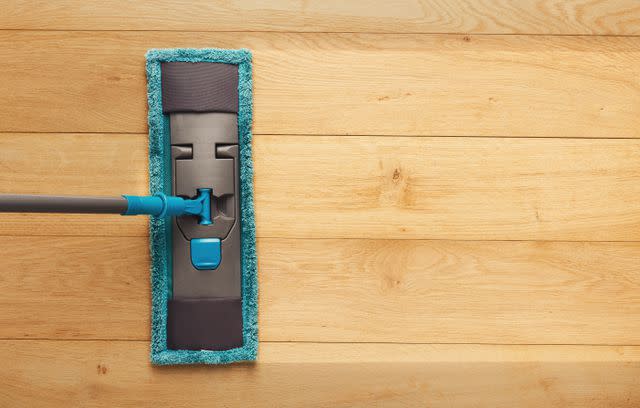How To Deep Clean Hardwood Floors, According To An Expert
If you’ve ever watched any show involving home renovations, you probably know how sought-after and special hardwood floors are. It’s not surprising that something so sought-after probably requires a bit of maintenance, too. Unlike laminate, vinyl, linoleum, textile, stone, or carpeted flooring, hardwood floors require a special version of deep cleaning.
“Some floor types, such as tile or luxury vinyl, are more durable and waterproof,” explains Kathy Turley, Director of Marketing for Home Clean Heroes in Virginia Beach, Virginia. “Wood is a more porous material, so you'll want to minimize liquid absorption.” Below, we’ve asked Turley for her best tips on how to deep clean hardwood floors the right way.
Meet The Expert
Kathy Turley is director of marketing for Home Clean Heroes in Virginia Beach, Virginia.

Getty Images
How Often to Deep Clean Hardwood Floors
Hardwood floors need regular cleaning. High-traffic areas need to be cleaned with a dust mop or vacuum frequently, daily if necessary. Clean spills and water puddles when they happen so they won’t stain or attract more dirt. With regular upkeep, you only need to use a damp mop to clean your floors every few months.
What You Need
Dust mop
Vacuum
Wet mop with a cleaning pad
Hardwood floor cleaner
Microfiber cloths
Putty knife
Mineral oil
How to Deep Clean Hardwood Floors
Start by getting rid of surface-level dust and debris using a dust mop with a microfiber cloth or a vacuum, just like you would during a regular clean. When using a vacuum, remember to adjust the setting from carpets to bare floors. The carpet setting lowers the rotating brush, which could scratch and dull hardwood floors over time. Choose a setting for bare floors to eliminate the bristles' contact with the floor surface.
Wet the cleaning pad on the mop with warm water. Make sure to use a damp mop rather than a soaking wet one, or use a floor spray designed for hardwood floors and a dry cleaning pad to clean the surface. “A soft cleaning pad will trap dirt as you go,” explains Turley. “Remember: avoid using too much liquid—if you accidentally use a little more than intended and the floors are damp, just be sure to go over everything with dry cleaning pads.”
When mopping the floors, be sure to look around for stains or buildup between the floorboards. “Putty knives can be used to gently scrape away grime, then gently spot clean anywhere that needs extra attention,” suggests Turley. “It’s optional, but using an antibacterial wood floor cleaner will disinfect the floor with a mop.”
How to Remove Stains from Hardwood Floors
Use a mineral oil and apply it to the stain.
Use a dry microfiber cloth to buff the stain away. “You don't want to use that oil as a spot cleaner (like you would use Resolve on carpet),” warns Turley. “After you buff the stain, we suggest distributing the oil to a larger section on and around the original stain site. Then, let it sit or ‘cure’ for several hours, and then wipe away with a clean dry microfiber cloth.”
What Not to Do When Deep Cleaning Hardwood Floors
There are a few things you should avoid when deep cleaning your hardwood floors. Stay away from abrasive cleaners or alkaline products (like vinegar). “Abrasive cleaners can scratch the floors and alkaline can dull the finish on the floor,” explains Turley. “If you are going to use vinegar, you will want to dilute it with water—a 50/50 mixture should do the trick.”
A simple mixture of soap and water is also safe. However, remember that wood is naturally porous and will absorb the liquid if too much is applied, causing damage or warping of the floor. “You'll need to take into consideration whether or not your floor has a finish (like a polyurethane) which acts as a barrier (and the water will pool) or if it is natural or unfinished, in which case the wood will absorb the water,” explains Turley.
Tips for Keeping Hardwood Floors Clean Longer
Indoor carpets protect the hardwood floors, but if you are going to cover them up, why have them in the first place? “Having guests and family remove their shoes before walking on your hardwoods can cut down on dirt and debris brought in on the shoes—unfortunately, this can act almost like sandpaper on the finish,” explains Turley. “This can dull or scratch the wood.”
For more Southern Living news, make sure to sign up for our newsletter!
Read the original article on Southern Living.

